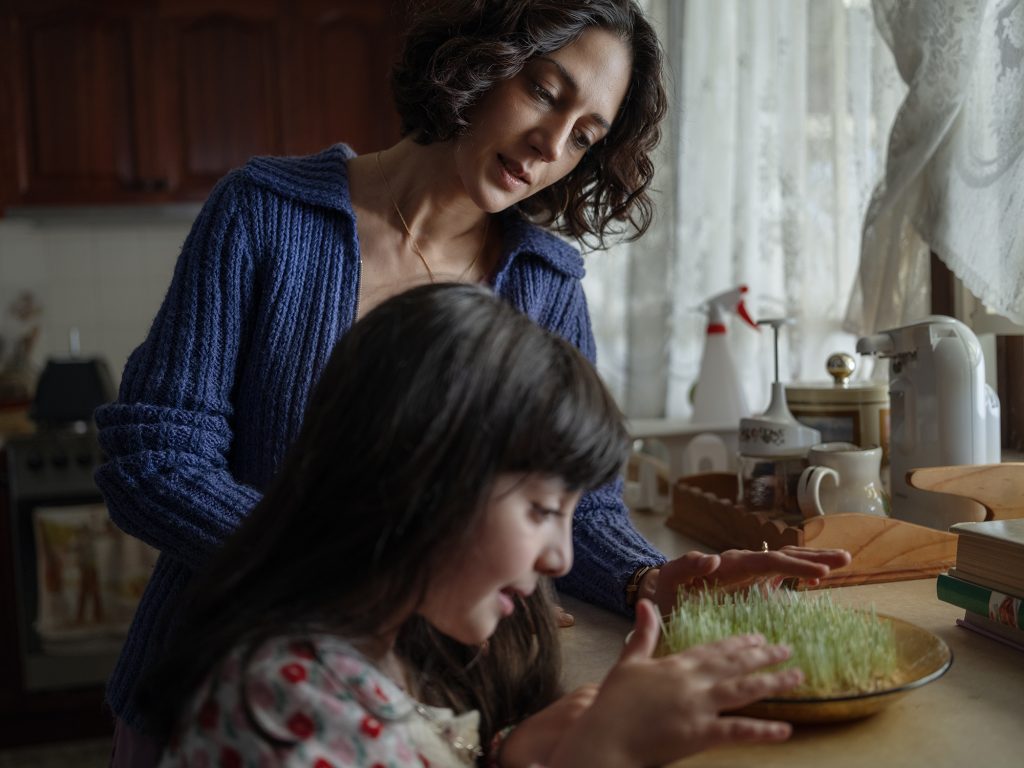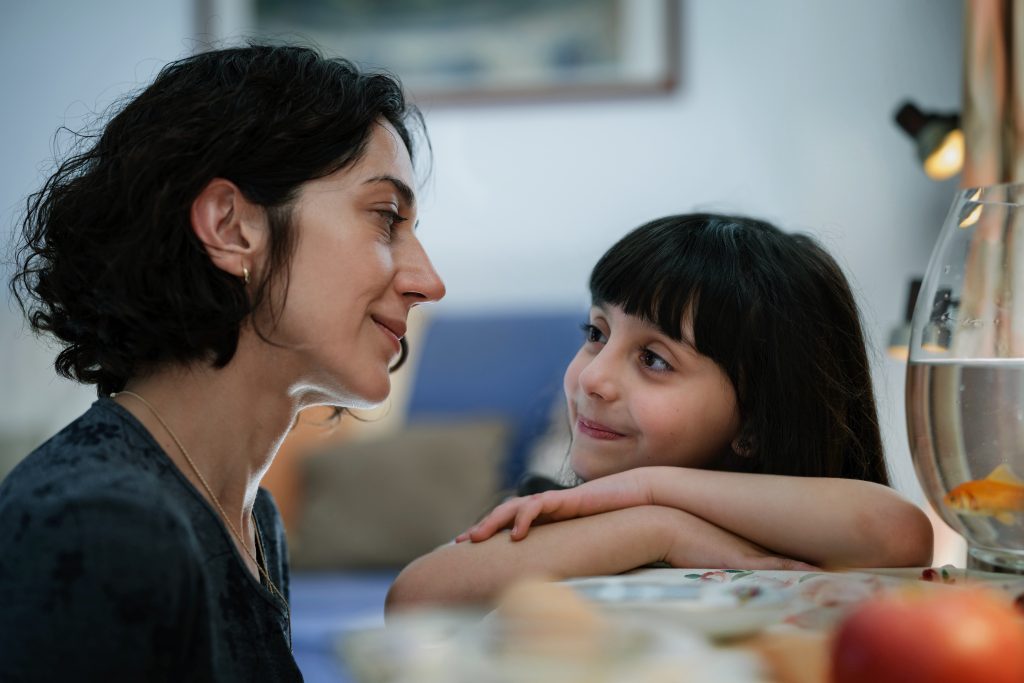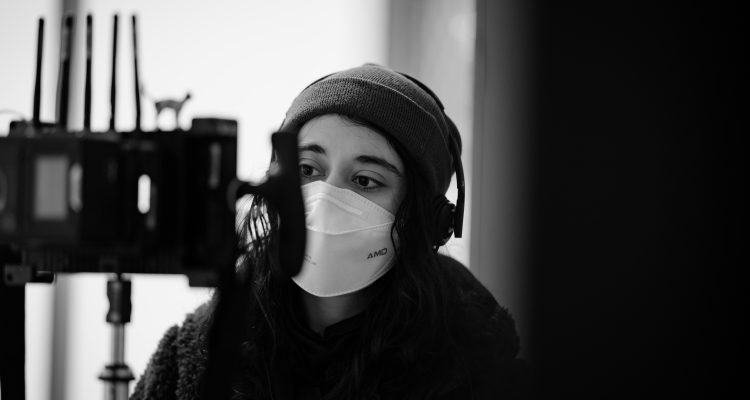Australian filmmaker Noora Niasari is having a busy year traveling the globe with her reverberating feature debut, Shayda, which premiered at the Sundance Film Festival in January.
Based on a memoir by Niasari’s mother, the film recounts her personal experience as an Iranian immigrant in Australia fleeing an abusive marriage with her daughter in tow. The film went on to win the Audience Award at Sundance and screened at the Toronto International Film Festival. Following its opening night screening at the Melbourne International Film Festival, Shayda was selected as Australia’s submission for the Best International Feature Film at the Academy Awards.
Shayda tells the story of Shayda (Zar Amir Ebrahimi), who flees her brutal and traumatic marriage to Houssein (Osamah Sami) and navigates an intersection of independence and conservative ideology as she takes refuge in a women’s shelter with daughter Mona (Selina Zahednia). As Shayda is forced into tense, court-mandated visits from her husband and pressures to return to him, she looks toward the possibility of rebirth as the Persian New Year Nowruz approaches.
Niasari harnesses her documentary filmmaking background and showcases a tender portrait of quiet resilience as Shayda’s world shifts on its axis. Ebrahami is extraordinary as the title character, humming with serenity in moments of solitude and carrying immense, traumatic moments with heart-breaking sadness. It’s a remarkable performance highlighting a dynamic and trusting partnership between actor and director.
“Zar [Amir Ebrahimi] trusted me, and I trusted her. We implicitly had this connection, and it was a really special collaboration for that reason,” shares Niasari. “She brought so much of herself and her life experience to the role. My job as a director was giving her the space and time.”
Niasari spoke with Awards Focus about being selected as Australia’s submission to the Oscars, drawing on her mother’s memoir for the film with reservations and sheltering child actor Zahednia with substitute scenarios from the film’s complex themes.

Awards Focus: What has been most impactful to you about the film’s reception on the festival circuit?
Noora Niasari: The most rewarding part of the process has been sharing it with audiences worldwide and feeling how it’s resonating with people from all different cultures and demographics.
At Sundance, it was the first time I’d screened the film for an audience, and it was really special because I was able to experience all of the film’s emotions with a group of people, and I realized how universal the story is. I can’t tell you how many people I’ve had crying after a screening, and I’ve been consoling them, and we’ve been sharing stories. I think that’s why we won the audience award at Sundance; the film comes from a place of authenticity and truth, and people feel that.
AF: Shayda is representing Australia in the International Film category for the Academy Awards. What did that selection mean to you?
Niasari: It’s honestly a dream come true. It is an Australian film, and my mother and I experienced freedom in Australia. If it weren’t for Australia, we wouldn’t be where we are today. I’m so grateful to have the country’s backing on this world stage and hopefully have a shot at the shortlist, which would be amazing.
AF: Can you talk a bit about the idea for the film and what you drew on to write the screenplay?
Niasari: I was five years old when I lived in the women’s shelter with my mum in Brisbane. It was around six years ago when I decided to take the step of making this film, but I needed my mum’s collaboration to do it. I had fractured childhood memories, so I asked her to write a memoir.
We spent around six months on that, and I held her hand and guided her through it. It was a very cathartic process for her because it tracked like ten years of her life from her arranged marriage through to many years after the shelter. I took that as the basis and wrote the first draft.
Over the three years that I worked on the screenplay, it was very much about finding the story’s cinematic potential beyond the autobiographical facts. It was a challenging process of towing that line of reality with fiction, so the film is emotionally autobiographical.
AF: The film is set in 1995 but in an undisclosed Australian city. Can you talk about accessing Iranian culture within Australia and recreating the era?
Niasari: In Australia in the nineties, there was a growing Iranian community. It was really about finding the color and life in particular events to do with the Persian New Year, the food, and the dancing. I lived that childhood in suburban Australia, going to the supermarket and buying goldfish, so it was very organic.
I had people in my team help advise the art department. My cinematographer is Iranian Australia, and so it all came from an authentic place of lived experience for us. The community also really embraced the film. We had probably a hundred volunteer extras for the fire jumping festival, which we filmed in Doncaster, in Melbourne. We had stall keepers from various markets Persian-themed markets, and it was the first time the government had funded an official Iranian Australian feature film, so it was kind of a big deal.
AF: Were you able to host a screening for everyone once the film premiered?
Niasari: We actually opened the Melbourne International Film Festival, and I made sure every single person who helped, especially community leaders, had a ticket to the opening night, came to the after-party, and danced on the dance floor. Everyone down to the Persian market grocery shop owners. For me, it was so important to acknowledge and celebrate people in the community who helped the film.

AF: Did your background in documentary filmmaking help you to find that cinematic potential in a story that is emotionally and truthfully autobiographical? Did you have any reservations about sharing your family’s story?
Niasari: I wouldn’t say I had no reservations. My mother and I had a lot of hard discussions, and deciding to make this film wasn’t a simple process.
In terms of documentary filmmaking, it’s being able to hold space for someone, allowing things to play out with patience. There are so many facets to making documentary films, which are so complimentary when it comes to narrative filmmaking.
My mother’s not in the film, but she read every draft. She gave me feedback, and I held space for her and her feelings. Then the woman, the shelter manager, played by Leah Purcell, she’s like a godmother to me. She became my mother’s best friend after the shelter experience and has been in our lives for over 30 years. I had many, many hours of phone calls with her as well while I was writing. The thing about docs is how to craft truth into a narrative, so it’s a great observation that those skills helped make this film.
AF: What you said about holding space plays out in the scene where Shayda is recounting the abuse she suffered through a translator over the phone. Overwhelmed, she exits the room to the stairwell and stands in a quiet, sorrowful moment to herself. Can you talk a bit about allowing that space for your cast to live in the scene while ensuring the technical and craft aspects behind the camera capture the moment?
Niasari: For me, that’s my main job as a director, to create that safe space for actors. Regardless of the apparatus of the shot, I make sure that they’re not privy to any of that. It’s all about giving them the comfort and safety to go to the end in terms of their emotional journey in a scene.
There was a challenge in shooting that scene in that the woman cast as the interpreter was not an actor; she was an older woman, and for some reason, she got stage fright and didn’t perform very well. We gave her a few chances, and Zar felt it was distracting and couldn’t perform. So I had to sit in and be the interpreter because I would do anything to help your performance, including me sitting in and acting [laughs]. Obviously, we cut out my voice later because it was too weird, but it got her there, and that’s my commitment to actors.
AF: Along with Zar Amir Ebrahimi, Selina Zahednia, who plays Mona, is exceptional. How did you go about finding and casting your Shayda and Mona?
Niasari: Finding a six-year-old Farsi-speaking girl in Australia was really challenging. It’s different from LA, where there are agencies. We went to Persian schools in every capital city, putting out flyers. It was very grassroots.
We had around a hundred girls who auditioned via Zoom, and then Selina was one of the shortlisted girls from Melbourne. She had this confidence and this spring in her step when she walked into the room. I gave her a situation, and she cried. Then, around 10 minutes later, she could dance, sing, and be joyful, so she understood acting like she’s one of those kids that’s born for this, you know?
It was important for me to protect her from the film’s themes. I knew that she was from a happy family and that she’d never experienced anything like this, and I just didn’t want to traumatize a child because I went through that. We spent around two months in rehearsals just with Selina, my assistant, and me creating all of the substitute scenarios for when we are on set, so all of the child-safe substitutions and planning, and how we are getting this scene without exposing her to X, you know?
It was a huge process in terms of that, and when it came to her a Zar, I created like a long-distance relationship. I would get Selina to send Zar video messages, and Zar would send photos back. She’d do drawings and mail them to her. By the time they met in Melbourne, they just fell in love and were just so playful.
During filming, I would see them being playful, and I would be like, let’s roll on this, and that’s also the documentary thing of letting scenes play out and being present and open to what’s in front of you.
AF: It’s fascinating to hear how you could film with Mona without exposing her to the difficult themes of Shayda’s story. It makes me think about the scene in the department store where Mona becomes aware that something terrible is happening as her father spies on Shayda shopping.
Niasari: Selina and Zar didn’t even cross paths in that department store. She didn’t even know she was seeing her mum. We gave her a different motivation for running away, which are the lengths directors must go to protect children from these kinds of movies. I’ve heard horror stories when it comes to child actors. It’s a hard thing to do, but at the time, it’s essential. It’s just a duty of care, and I felt really maternal and instinctual about that.


